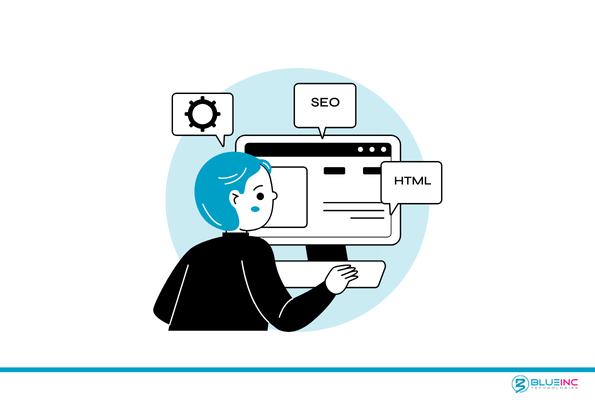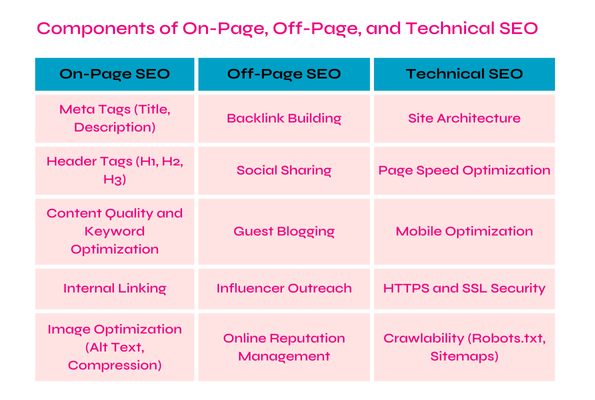
Creating a beautifully designed website is only half the battle. If your site isn’t optimized for search engines, it may never reach your intended audience. Integrating SEO into your web development strategy from the start can save time, resources, and ensure your website performs well both technically and in search engine rankings. But why exactly is SEO so critical to web development? Let’s dive into the details.
The Role of SEO in Web Development
Your website acts as the digital face of your business, but it’s SEO that gives it visibility. Without SEO, even the most visually stunning website could remain hidden in the depths of search engine results. Incorporating SEO from the very beginning of the web development process is crucial to ensuring your site is search engine-friendly and delivers a strong user experience.
SEO and Web Development go hand-in-hand. SEO helps structure and optimize a site in ways that make it more accessible to both search engines and users. Optimized elements such as fast load times, mobile-friendly design, and user-focused navigation all help boost rankings and user satisfaction.
Key Components of SEO in Web Development
To fully understand how SEO fits into web development, let’s break down some of the key components:
1. On-Page SEO
- Meta Tags and Headers: These elements help search engines understand what each page is about. Every page should have optimized title tags, meta descriptions, and header tags (H1, H2, etc.) that include relevant keywords.
- Content Quality: High-quality content should be aligned with user intent. The content on your site needs to be informative, relevant, and keyword-optimized to increase search visibility.
- Internal Linking: Proper internal linking helps search engines understand the structure of your site and keeps users engaged. When done correctly, it can improve site navigation and SEO performance.
2. Technical SEO
- Site Architecture: The structure of your website is a key ranking factor. Ensure that important pages are accessible within 2-3 clicks from the homepage. A well-organized site helps search engines crawl and index pages effectively.
- Page Speed: Slow-loading sites hurt both SEO rankings and user experience. Compress images, use browser caching, and implement lazy loading to ensure pages load quickly.
- Mobile Optimization: Google’s mobile-first indexing makes mobile responsiveness essential. A website that performs well on mobile devices is crucial for ranking well.
- HTTPS: Securing your site with HTTPS is a must for both SEO and user trust. Google considers HTTPS as a ranking signal, and it’s also essential for safeguarding sensitive user data.
3. Off-Page SEO Factors
- Backlinks: Building backlinks from reputable sites adds authority to your website, helping it rank higher. Even though this process largely happens off-site, having a well-structured and SEO-friendly website makes it easier to attract quality backlinks.
- Social Sharing: An SEO-optimized site will be easier to share on social media platforms, driving traffic and increasing your chances of earning backlinks.
Common Web Development Mistakes That Hurt SEO
Even with the best intentions, there are certain web development mistakes that can hurt SEO rankings if not addressed early on:
- Ignoring Mobile Responsiveness: Not having a responsive design will hurt your rankings, as Google prioritizes mobile-friendly websites. Make sure your site adjusts to different screen sizes smoothly.
- Slow Load Times: If your site takes longer than 3 seconds to load, users will leave. Search engines will penalize slow sites. Optimizing page speed is critical for ranking well and reducing bounce rates.
- Inconsistent URLs and Broken Links: Websites with broken links or inconsistent URL structures confuse both search engines and users. Ensure your URLs are simple, descriptive, and include relevant keywords.
Why Early SEO Integration Matters
Integrating SEO into the web development process from the very beginning ensures a solid foundation for your website’s future growth. Here’s why early integration matters:
1. Cost-Efficiency
Implementing SEO best practices during the development stage is much more cost-effective than trying to fix SEO issues later. Retrofitting a website with SEO can be time-consuming and costly, especially when technical changes are required.
2. Enhanced User Experience
SEO best practices like fast load times, clear navigation, and mobile-friendliness all contribute to better user experience. Happy users lead to lower bounce rates and higher conversions, which in turn, improve SEO rankings.
3. Faster Ranking Improvements
By building a website with SEO in mind from the start, search engines can crawl, index, and rank your site more quickly. This means you’ll start seeing traffic and results sooner, rather than waiting to fix SEO issues after launch.
Best Practices for Integrating SEO into Web Development
To successfully integrate SEO into web development, follow these best practices:
1. Early Collaboration
SEO specialists and web developers should collaborate from the planning phase. By ensuring both teams are aligned, the development process can be streamlined, and SEO best practices can be built into the structure of the site.
2. Use SEO Tools
Tools like Google Search Console, Ahrefs, and Semrush can help you track and measure the effectiveness of your SEO strategy from the development stage onwards. These tools ensure that your site is optimized for crawling, indexing, and ranking.
3. Regular Audits
Even after launch, it’s important to regularly audit your website to ensure that it remains optimized for SEO. Search engine algorithms change, and ongoing audits help maintain and improve site performance.
Conclusion: Building for SEO Success
Integrating SEO into your web development strategy is not just an optional enhancement; it’s essential for long-term success. By addressing SEO from the start, you ensure that your website is built to attract organic traffic, improve user experience, and deliver the results you’re looking for.
For more insights on SEO best practices in web development, check out our blog post on SEO Web Design: How To Build a Website That Ranks.






